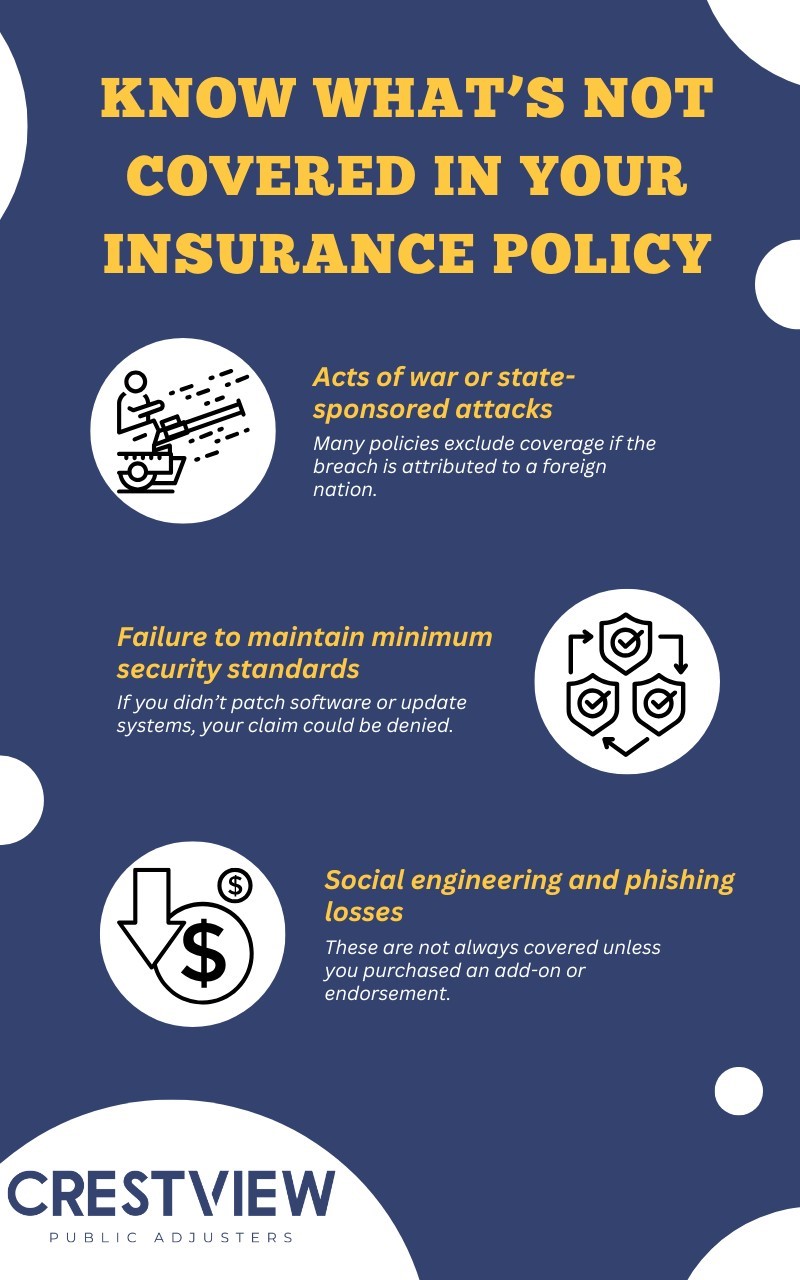Key Points:
- Many policyholders unintentionally delay notifications, overlook policy language, or mishandle documentation, leading to denied cyber insurance claims.
- Understanding your policy’s exclusions and your insurer’s requirements is crucial to a smooth claims process.
- Public Adjusters like Crestview can help ensure proper claim filing, negotiation, and settlement—especially in states like New York, New Jersey, and Florida.
Cyberattacks are not just increasing—they’re exploding. In 2023 alone, the FBI’s Internet Crime Complaint Center (IC3) reported over $12.5 billion in losses due to cybercrime. As more businesses turn to cyber insurance for protection, an alarming number are finding their claims denied or delayed due to simple, avoidable errors. Whether it’s misunderstanding policy requirements or failing to report incidents promptly, these missteps can jeopardize your ability to recover from a cyber loss.
Common Mistakes in Filing Cyber Insurance Claims
Yes, there are several common mistakes in filing cyber insurance claims that can lead to claim denials, delays, or reduced payouts.These errors often include late notification, insufficient documentation, and failing to understand the scope and exclusions of the policy. Policyholders need to follow their insurer’s process closely, document thoroughly, and meet all deadlines to ensure a successful claim.
Why Are Cyber Insurance Claims Often Denied?
Cyber insurance policies are full of technicalities—and missing one could cost you thousands. Many denials stem from avoidable oversights, not fraudulent behavior. Carriers often reject claims based on technical non-compliance or misinterpretation of policy terms. That’s why it’s essential to dig into the fine print before you ever need to file.
Some key factors leading to denials:
- Delayed reporting: Many policies require notification “as soon as practicable” or within 24–72 hours of discovering a breach.
- Policy exclusions: Some policies don’t cover social engineering or insider threats unless explicitly added.
- Misunderstood coverage: Many businesses assume first-party and third-party coverages are the same—when they’re not.
Understanding the policy up front is your first line of defense in avoiding common mistakes when filing cyber insurance claims.

What Happens If You Report a Cyber Incident Too Late?
Timing is everything in cyber insurance. Once an incident occurs, the clock starts ticking—and fast.
Most cyber insurance policies have strict timelines for reporting claims. Missing these deadlines, even by a few hours, can result in total claim denial. This urgency exists because early response efforts (such as engaging breach counsel and IT forensic experts) can mitigate damage, which insurers want to oversee.
Here’s what could go wrong if you report late:
- Claim denied outright for failure to meet policy terms.
- Insurer may claim prejudice, arguing they could have minimized damage if they’d been notified earlier.
- Loss of reimbursement for early vendor costs if pre-approval wasn’t secured from the insurer.
Always notify your insurer immediately—even if you’re unsure whether the event is covered. It’s better to retract a report than to miss the reporting window altogether.
How Does Poor Documentation Derail Your Cyber Insurance Claim?
Cyber incidents are inherently chaotic, and without clear documentation, the risk to your organization increases significantly. Many policyholders make the mistake of relying solely on IT teams or third-party vendors to manage the response, overlooking the crucial step of collecting the information that insurers require. Poor documentation can lead to claim denials, as gaps in the narrative may allow insurers to argue ambiguity or non-compliance. To protect your claim, it’s essential to maintain a detailed timeline starting from the first sign of intrusion.
Additionally, you should preserve all relevant evidence—this includes communications, system logs, and any actions taken during the response. Keep copies of contracts and communications with pre-approved vendors, as these can substantiate your claim. Remember, your insurer isn’t just focused on what happened during the incident—they’re also evaluating how you responded and the reasoning behind your decisions. Clear, thorough documentation can make all the difference in ensuring your claim is approved.
Do You Really Understand Your Policy Exclusions?
Exclusions are the silent killers of many cyber insurance claims. Even if your loss feels “cyber-related,” exclusions can eliminate coverage without you realizing it.
Here are a few common exclusions found in cyber policies:

Policy language is complex, and many businesses don’t discover these exclusions until it’s too late. Consider reviewing your policy with a cyber insurance expert or public adjuster before a loss occurs—not just after.
Are You Choosing the Wrong Vendors Without Insurer Approval?
A breach can trigger the instinct to reach out to your trusted IT team or legal counsel. However, if those vendors aren’t pre-approved by your cyber insurance provider, you could risk losing reimbursement for their services. Most policies include “panel provider” requirements, which means you’re required to choose from a list of approved forensic, public relations, and legal vendors. If you engage outside help without your insurer’s consent, your claim may be denied. Some policies do allow the use of external vendors, but only with prior written approval.
Timing is crucial in the immediate aftermath of a breach—especially within the first 24 hours. That’s why it’s essential to contact your insurance carrier or broker as soon as possible before taking action. Coordinating with them ensures your response complies with policy requirements and avoids complications with reimbursement. Don’t let a lack of communication cost you more than the breach itself.
Are You Failing to Quantify the Financial Impact Properly?
Cyber losses are not just technical—they’re financial. However, many claimants struggle to connect the breach to business interruptions, revenue loss, or restoration costs. To strengthen your claim, collaborate with your finance team to calculate the true cost of downtime. Be sure to include expenses related to notifying customers, restoring systems, and replacing damaged hardware. It’s also important to document any reputational impacts, particularly if the incident led to client churn. Insurers require clear evidence of measurable loss, so vague estimates won’t suffice. Detailed profit and loss projections, supported by third-party audits, provide the strongest defense for your claim.
Are You Misunderstanding the Claims Process Entirely?
Cyber insurance claims don’t function like traditional property claims. They often involve legal counsel, multiple layers of approval, and extremely tight deadlines. Many policyholders:
- Underestimate how much legal involvement is needed.
- Submit incomplete claim forms, delaying the process.
- Fail to engage a public adjuster or third-party advocate to help navigate the system.
You need a partner who knows what insurers look for—and how to package your documentation to avoid objections.

How Can Public Adjusters Help Avoid These Mistakes?
Public Adjusters are licensed professionals who represent the policyholder—not the insurance company. Their job is to ensure that your claim is properly presented, negotiated, and paid in full, based on your policy terms.
Involving a Public Adjuster early in the process, you can:
- Avoid missing documentation or deadlines.
- Get help interpreting policy language and exclusions.
- Maximize your payout by quantifying and supporting losses professionally.
In high-stakes cyber insurance claims, having an experienced adjuster on your side could be the difference between a partial payment and a full recovery.
Protect Your Cyber Claim—Partner with a Trusted Public Adjuster
Cyber insurance claims are complex, time-sensitive, and filled with technical traps that can lead to denials or underpaid settlements. Whether you’re a small business in New Jersey, a startup in New York, or an enterprise in Florida, Crestview Public Adjusters can help you avoid the common mistakes in filing cyber insurance claims and ensure your claim is handled correctly.
Let us take the pressure off your team. We help you navigate policy language, handle documentation, and fight for the maximum recovery you’re entitled to.
Contact Crestview Public Adjusters today—your ally in cyber insurance claims.

